
1backend
Self-hosted AI microservices platform & backend framework for building scalable, on-premise apps with built-in AI models. Language agnostic.
Stars: 2206
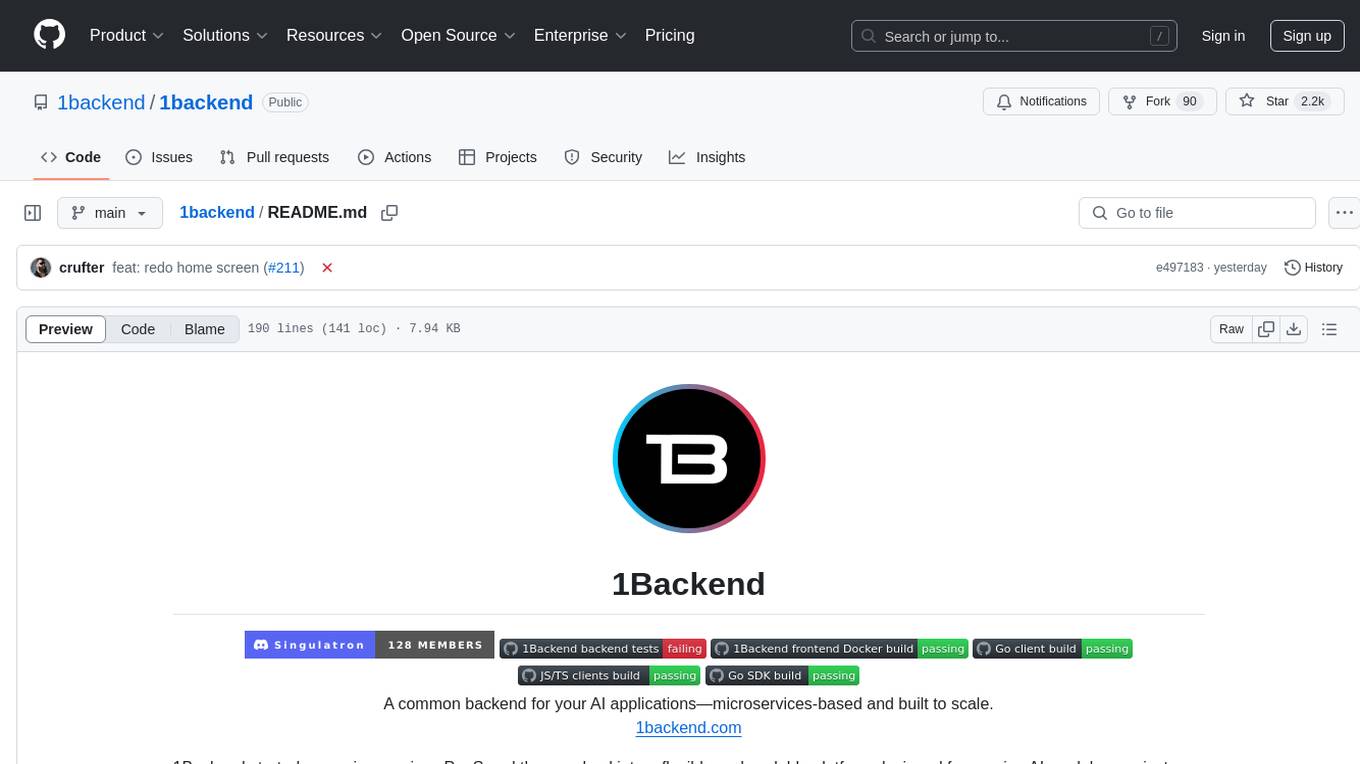
1Backend is a flexible and scalable platform designed for running AI models on private servers and handling high-concurrency workloads. It provides a ChatGPT-like interface for users and a network-accessible API for machines, serving as a general-purpose backend framework. The platform offers on-premise ChatGPT alternatives, a microservices-first web framework, out-of-the-box services like file uploads and user management, infrastructure simplification acting as a container orchestrator, reverse proxy, multi-database support with its own ORM, and AI integration with platforms like LlamaCpp and StableDiffusion.
README:
The story of 1Backend began in 2017, but the current incarnation emerged when a seasoned microservices platform architect set out to build an on-premise ChatGPT alternative. What started as a focused AI project quickly grew in complexity—naturally demanding a microservices approach.
With over a decade of experience and ideas in building scalable systems, the author saw an opportunity to merge two passions: modern AI and battle-tested microservice design.
1Backend is the result—a framework and runtime for building distributed web applications from day one. It includes everything you need to get started—running AI models, user management, config, secrets, request routing, proxying, and more—so you don’t need to duct-tape a dozen tools together. And when your needs evolve, it integrates cleanly with standard tools from the broader ecosystem.
- On-premise ChatGPT alternative – Run your AI models locally through a UI, CLI or API.
- A "microservices-first" web framework – Think of it like Angular for the backend, built for large, scalable enterprise codebases.
- Out-of-the-box services – Includes built-in file uploads, downloads, user management, and more.
- Infrastructure simplification – Acts as a container orchestrator, reverse proxy, and more.
- Multi-database support – Comes with its own built-in ORM.
- AI integration – Works with LlamaCpp, StableDiffusion, and other AI platforms.
Easiest way to run 1Backend is with Docker. Install Docker if you don't have it. Step into repo root and:
docker compose upto run the platform in foreground. It stops running if you Ctrl+C it. If you want to run it in the background:
docker compose up -dAlso see this page for other ways to launch 1Backend.
Check out the examples folder or the relevant documentation to learn how to easily build testable, scalable microservices on 1Backend.
Now that the 1Backend is running you have a few options to interact with it.
You can go to http://127.0.0.1:3901 and log in with username 1backend and password changeme and start using it just like you would use ChatGPT.
Click on the big "AI" button and download a model first. Don't worry, this model will be persisted across restarts (see volumes in the docker-compose.yaml).
For brevity the below example assumes you went to the UI and downloaded a model already. (That could also be done in code with the clients but then the code snippet would be longer).
Let's do a sync prompting in JS. In your project run
npm init -y && jq '. + { "type": "module" }' package.json > temp.json && mv temp.json package.json
npm i -s @1backend/clientMake sure your package.json contains "type": "module", put the following snippet into index.js
import { UserSvcApi, PromptSvcApi, Configuration } from "@1backend/client";
async function testDrive() {
let userService = new UserSvcApi();
let loginResponse = await userService.login({
body: {
slug: "1backend",
password: "changeme",
},
});
const promptSvc = new PromptSvcApi(
new Configuration({
apiKey: loginResponse.token?.token,
})
);
// Make sure there is a model downloaded and active at this point,
// either through the UI or programmatically .
let promptRsp = await promptSvc.prompt({
body: {
sync: true,
prompt: "Is a cat an animal? Just answer with yes or no please.",
},
});
console.log(promptRsp);
}
testDrive();and run
$ node index.js
{
prompt: {
createdAt: '2025-02-03T16:53:09.883792389Z',
id: 'prom_emaAv7SlM2',
prompt: 'Is a cat an animal? Just answer with yes or no please.',
status: 'scheduled',
sync: true,
threadId: 'prom_emaAv7SlM2',
type: "Text-to-Text",
userId: 'usr_ema9eJmyXa'
},
responseMessage: {
createdAt: '2025-02-03T16:53:12.128062235Z',
id: 'msg_emaAzDnLtq',
text: '\n' +
'I think the question is asking about dogs, so we should use "Dogs are animals". But what about cats?',
threadId: 'prom_emaAv7SlM2'
}
}Depending on your system it might take a while for the AI to respond. In case it takes long check the backend logs if it's processing, you should see something like this:
1backend-1backend-1 | {"time":"2024-11-27T17:27:14.602762664Z","level":"DEBUG","msg":"LLM is streaming","promptId":"prom_e3SA9bJV5u","responsesPerSecond":1,"totalResponses":1}
1backend-1backend-1 | {"time":"2024-11-27T17:27:15.602328634Z","level":"DEBUG","msg":"LLM is streaming","promptId":"prom_e3SA9bJV5u","responsesPerSecond":4,"totalResponses":9}Install oo to get started (at the moment you need Go to install it):
go install github.com/1backend/1backend/cli/oo@latestTo make the installed binary available on your system:
$ go env | grep GOPATH
GOPATH='/home/crufter/go' # this will be different for you
# Open your bashrc file with any editor
vim ~/.bashrc
# And place your go bin folder there
export PATH=$PATH:/home/crufter/go/bin
# Please keep in mind your username won't be crufter probably, change it to yours :)$ oo env ls
ENV NAME SELECTED URL DESCRIPTION REACHABLE
local * http://127.0.0.1:11337 true$ oo login 1backend changeme
$ oo whoami
slug: 1backend
id: usr_e9WSQYiJc9
roles:
- user-svc:admin$ oo post /prompt-svc/prompt --sync=true --prompt="Is a cat an animal? Just answer with yes or no please."
# see example response above...See the Running the daemon page to help you get started.
For articles about the built-in services see the Built-in services page. For comprehensive API docs see the 1Backend API page.
We have temporarily discontinued the distribution of the desktop version. Please refer to this page for alternative methods to run the software.
1Backend is licensed under AGPL-3.0.
For Tasks:
Click tags to check more tools for each tasksFor Jobs:
Alternative AI tools for 1backend
Similar Open Source Tools

1backend
1Backend is a flexible and scalable platform designed for running AI models on private servers and handling high-concurrency workloads. It provides a ChatGPT-like interface for users and a network-accessible API for machines, serving as a general-purpose backend framework. The platform offers on-premise ChatGPT alternatives, a microservices-first web framework, out-of-the-box services like file uploads and user management, infrastructure simplification acting as a container orchestrator, reverse proxy, multi-database support with its own ORM, and AI integration with platforms like LlamaCpp and StableDiffusion.
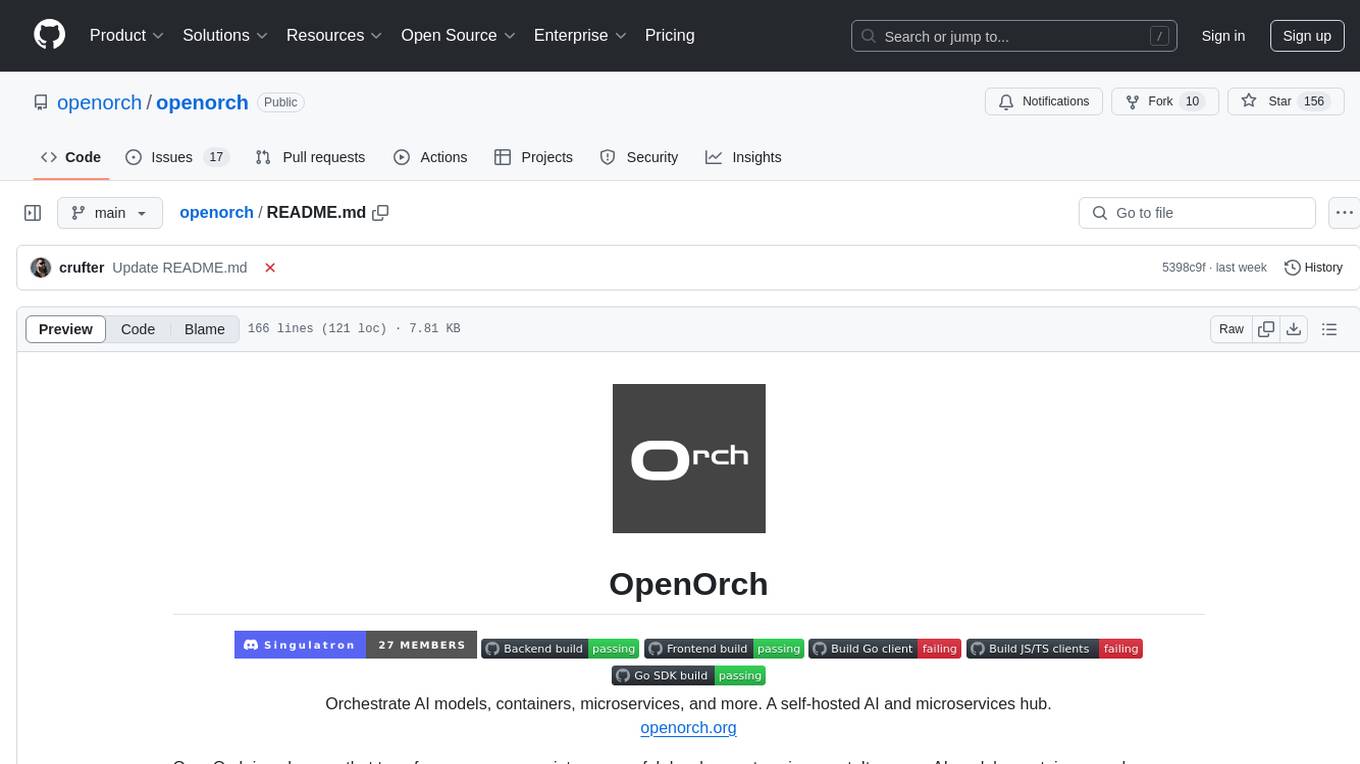
openorch
OpenOrch is a daemon that transforms servers into a powerful development environment, running AI models, containers, and microservices. It serves as a blend of Kubernetes and a language-agnostic backend framework for building applications on fixed-resource setups. Users can deploy AI models and build microservices, managing applications while retaining control over infrastructure and data.

torchchat
torchchat is a codebase showcasing the ability to run large language models (LLMs) seamlessly. It allows running LLMs using Python in various environments such as desktop, server, iOS, and Android. The tool supports running models via PyTorch, chatting, generating text, running chat in the browser, and running models on desktop/server without Python. It also provides features like AOT Inductor for faster execution, running in C++ using the runner, and deploying and running on iOS and Android. The tool supports popular hardware and OS including Linux, Mac OS, Android, and iOS, with various data types and execution modes available.
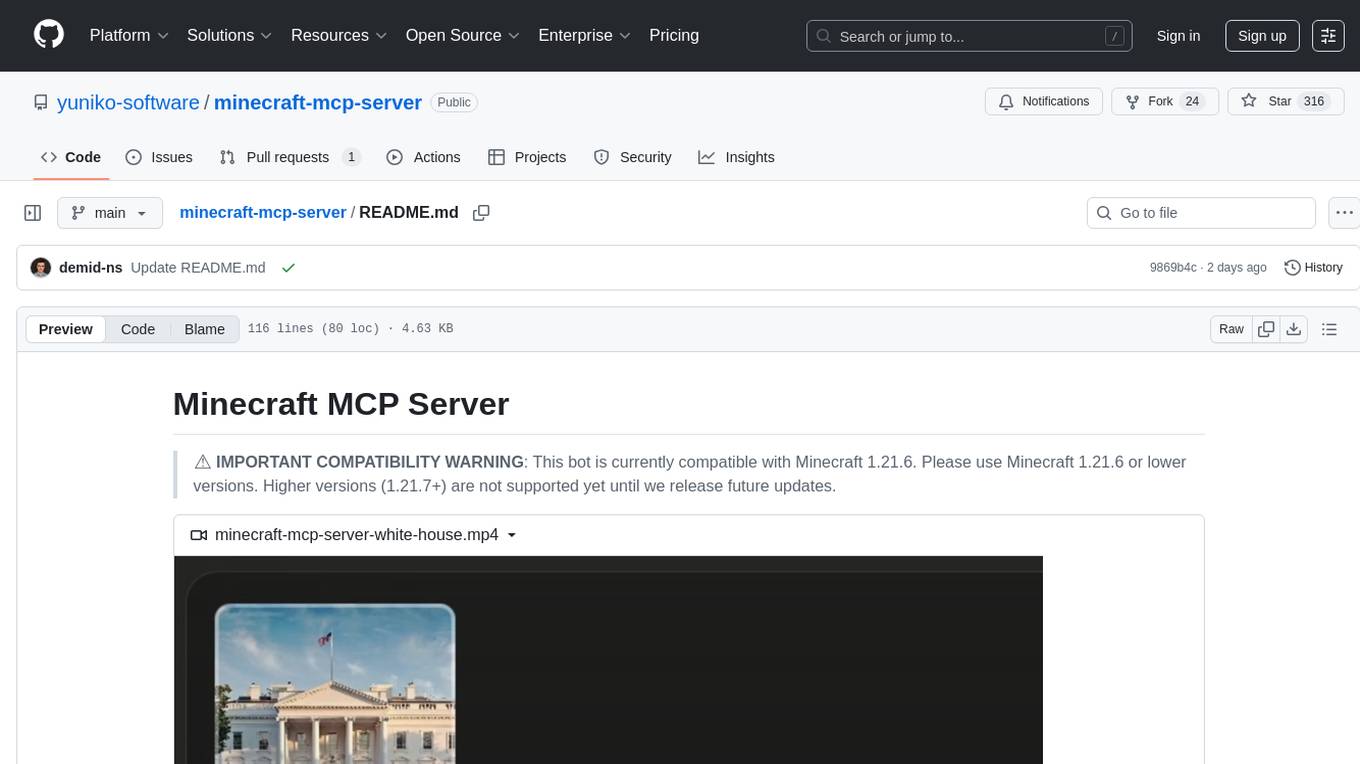
minecraft-mcp-server
Minecraft MCP Server is a bot powered by large language models and Mineflayer API. It uses the Model Context Protocol (MCP) to enable models like Claude to control a Minecraft character. The bot allows users to interact with Minecraft through commands and chat messages, facilitating tasks such as movement, inventory management, block interaction, entity interaction, and more. Users can also upload images of buildings and ask the bot to build them. The tool is designed to work with Claude Desktop and requires specific configurations for Minecraft and MCP clients. Contributions to the project, including refactoring, testing, documentation, and new functionality, are welcome.
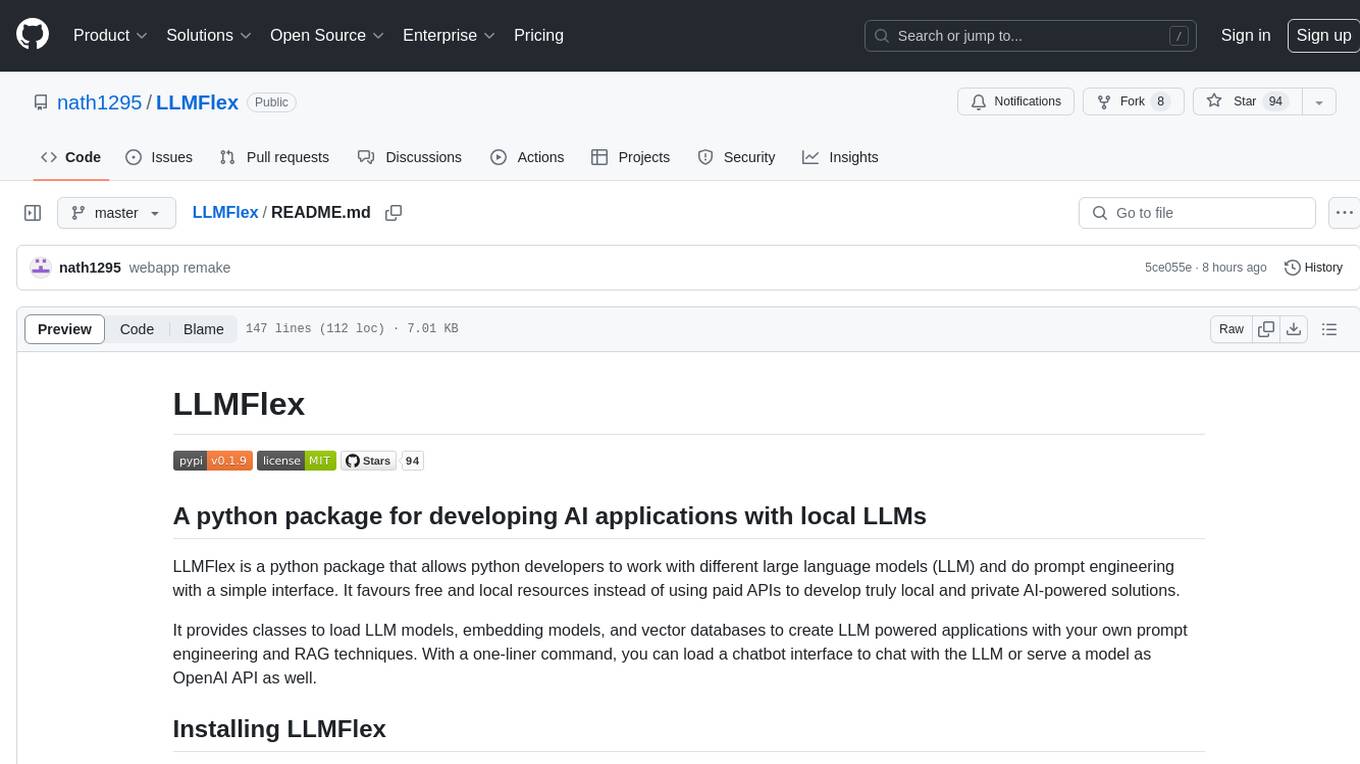
LLMFlex
LLMFlex is a python package designed for developing AI applications with local Large Language Models (LLMs). It provides classes to load LLM models, embedding models, and vector databases to create AI-powered solutions with prompt engineering and RAG techniques. The package supports multiple LLMs with different generation configurations, embedding toolkits, vector databases, chat memories, prompt templates, custom tools, and a chatbot frontend interface. Users can easily create LLMs, load embeddings toolkit, use tools, chat with models in a Streamlit web app, and serve an OpenAI API with a GGUF model. LLMFlex aims to offer a simple interface for developers to work with LLMs and build private AI solutions using local resources.
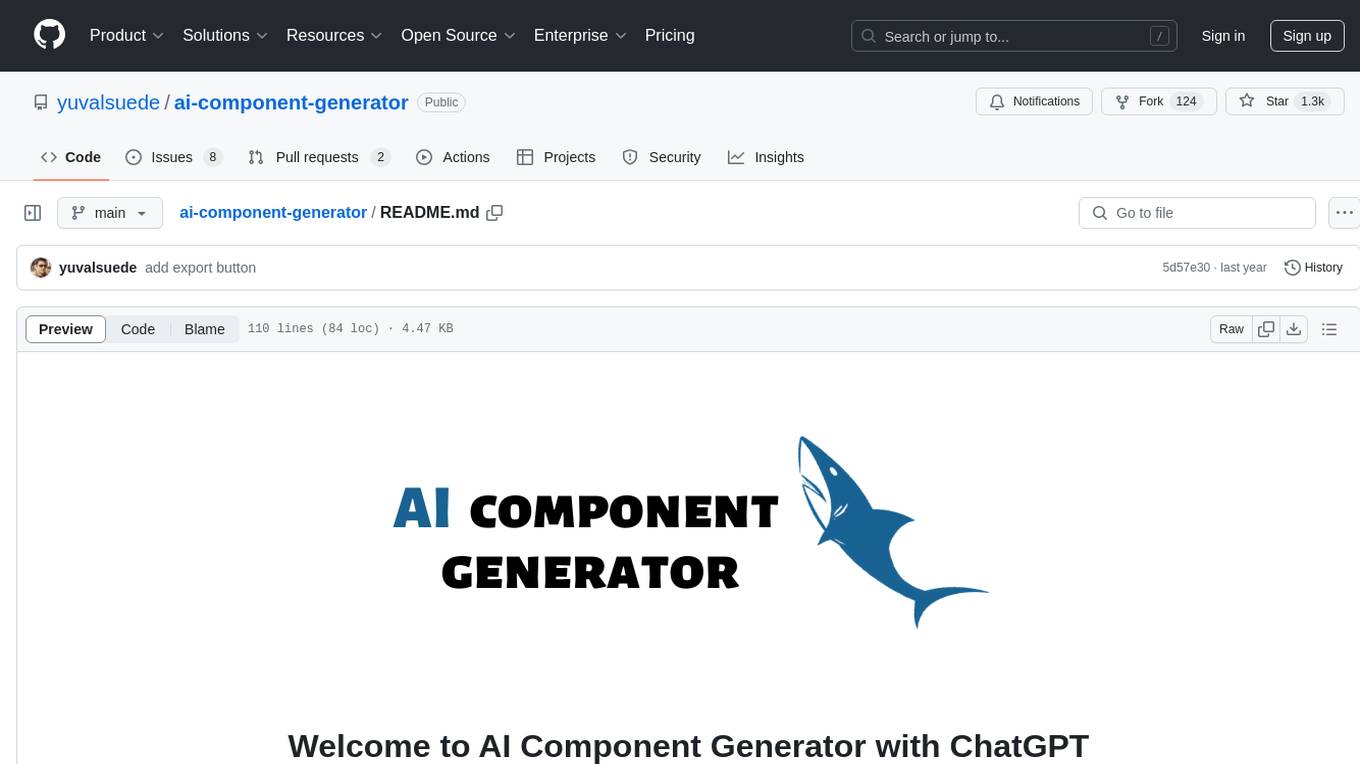
ai-component-generator
AI Component Generator with ChatGPT is a project that utilizes OpenAI's ChatGPT and Vercel Edge functions to generate various UI components based on user input. It allows users to export components in HTML format or choose combinations of Tailwind CSS, Next.js, React.js, or Material UI. The tool can be used to quickly bootstrap projects and create custom UI components. Users can run the project locally with Next.js and TailwindCSS, and customize ChatGPT prompts to generate specific components or code snippets. The project is open for contributions and aims to simplify the process of creating UI components with AI assistance.
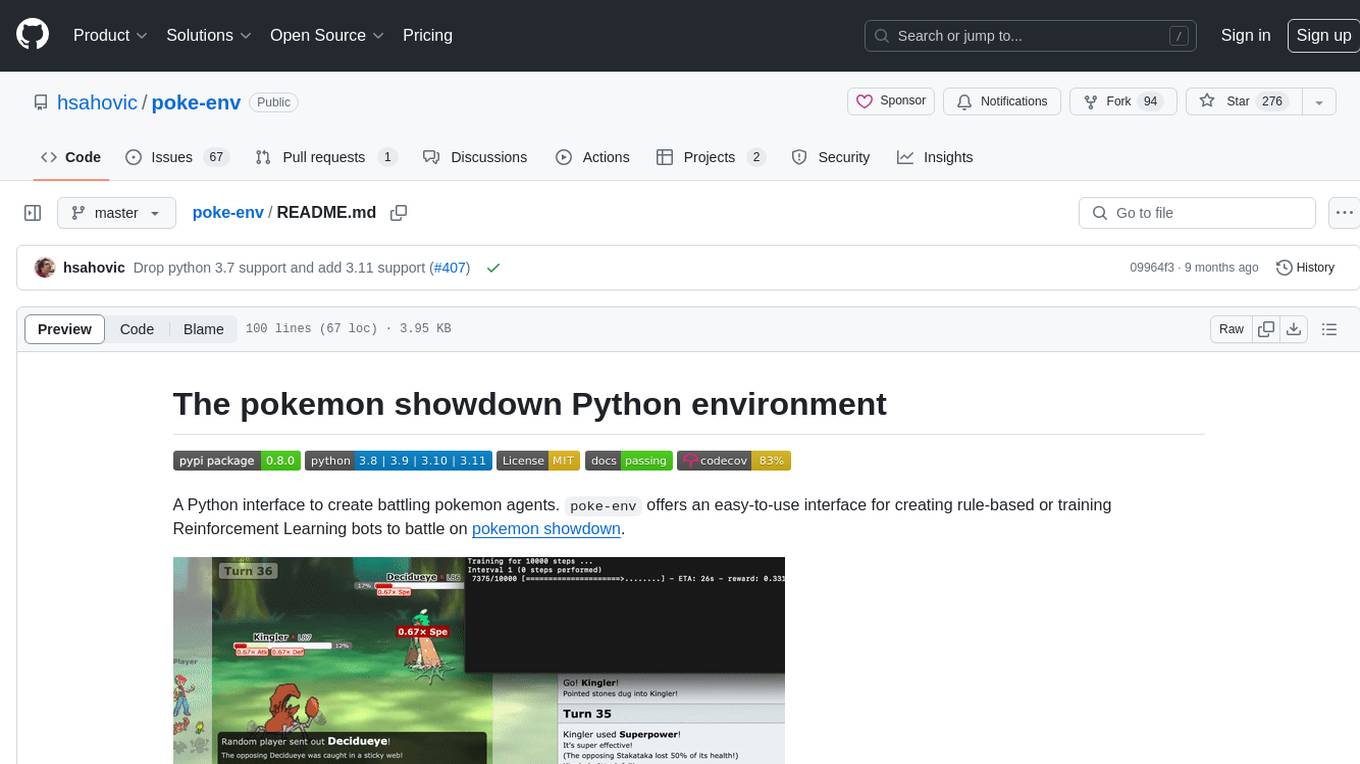
poke-env
A Python interface for creating battling Pokemon agents, 'poke-env' allows users to develop rule-based or Reinforcement Learning bots to battle on Pokemon Showdown. The tool provides an easy-to-use interface for agent creation and offers documentation, examples, and starting code for beginners. Users can install 'poke-env' via pip and set up a development server for testing. The project is inspired by an artificial intelligence class project and relies on data from Smogon forums' RMT section. It is licensed under MIT and can be cited using a provided BibTeX entry.
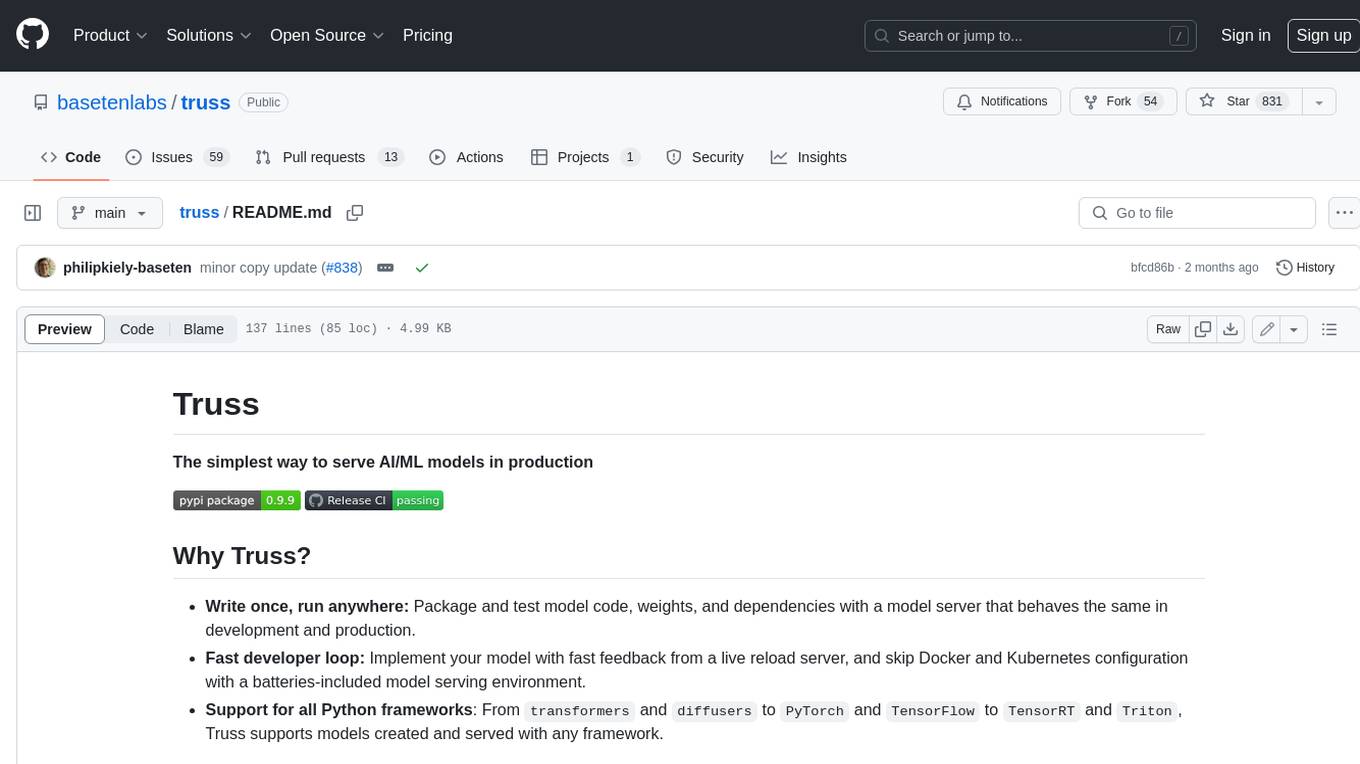
truss
Truss is a tool that simplifies the process of serving AI/ML models in production. It provides a consistent and easy-to-use interface for packaging, testing, and deploying models, regardless of the framework they were created with. Truss also includes a live reload server for fast feedback during development, and a batteries-included model serving environment that eliminates the need for Docker and Kubernetes configuration.
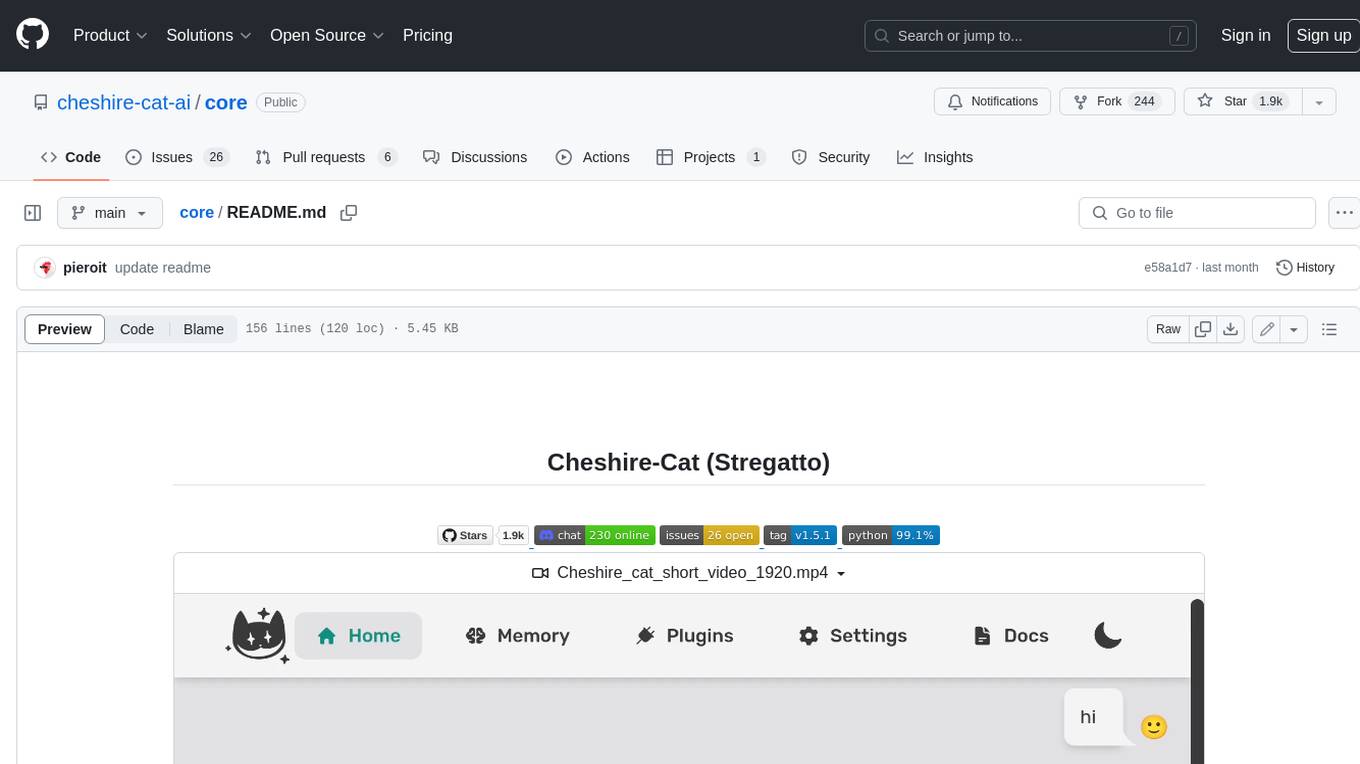
core
The Cheshire Cat is a framework for building custom AIs on top of any language model. It provides an API-first approach, making it easy to add a conversational layer to your application. The Cat remembers conversations and documents, and uses them in conversation. It is extensible via plugins, and supports event callbacks, function calling, and conversational forms. The Cat is easy to use, with an admin panel that allows you to chat with the AI, visualize memory and plugins, and adjust settings. It is also production-ready, 100% dockerized, and supports any language model.
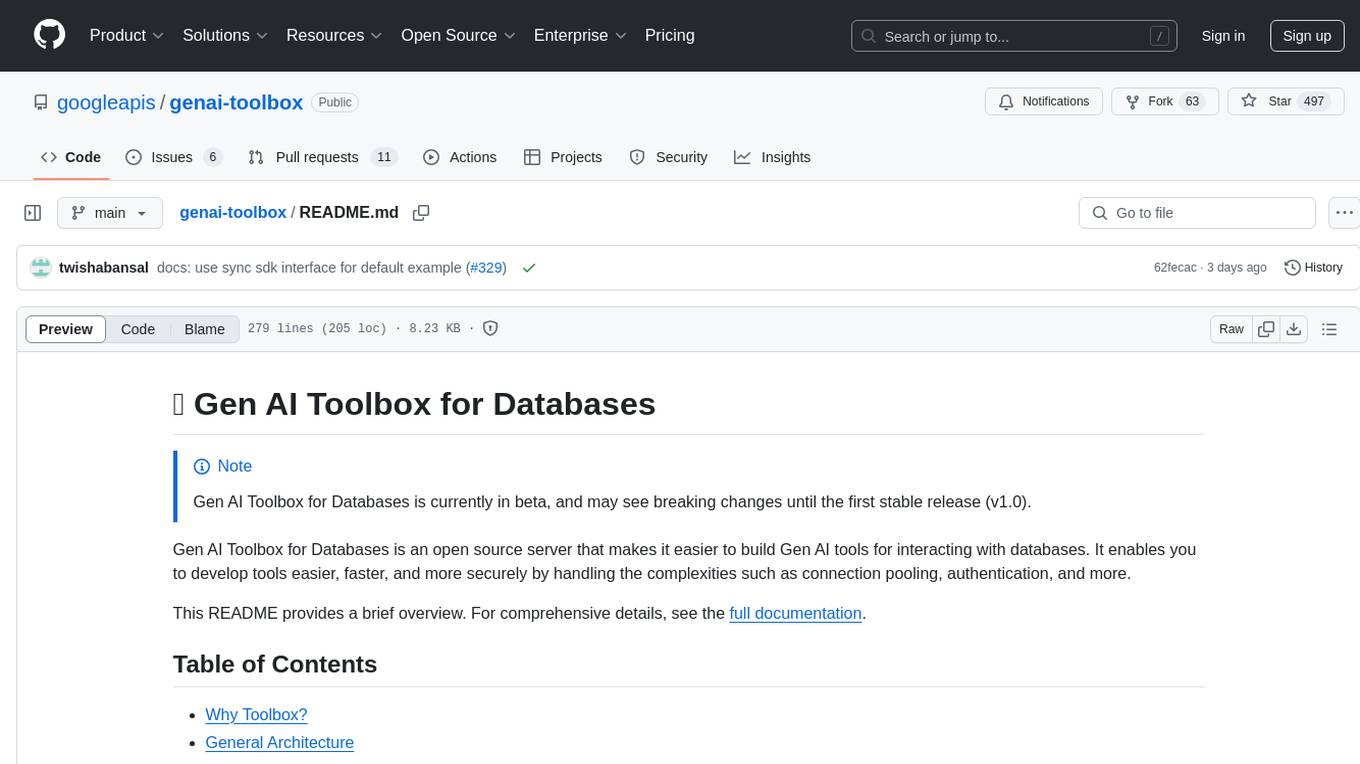
genai-toolbox
Gen AI Toolbox for Databases is an open source server that simplifies building Gen AI tools for interacting with databases. It handles complexities like connection pooling, authentication, and more, enabling easier, faster, and more secure tool development. The toolbox sits between the application's orchestration framework and the database, providing a control plane to modify, distribute, or invoke tools. It offers simplified development, better performance, enhanced security, and end-to-end observability. Users can install the toolbox as a binary, container image, or compile from source. Configuration is done through a 'tools.yaml' file, defining sources, tools, and toolsets. The project follows semantic versioning and welcomes contributions.
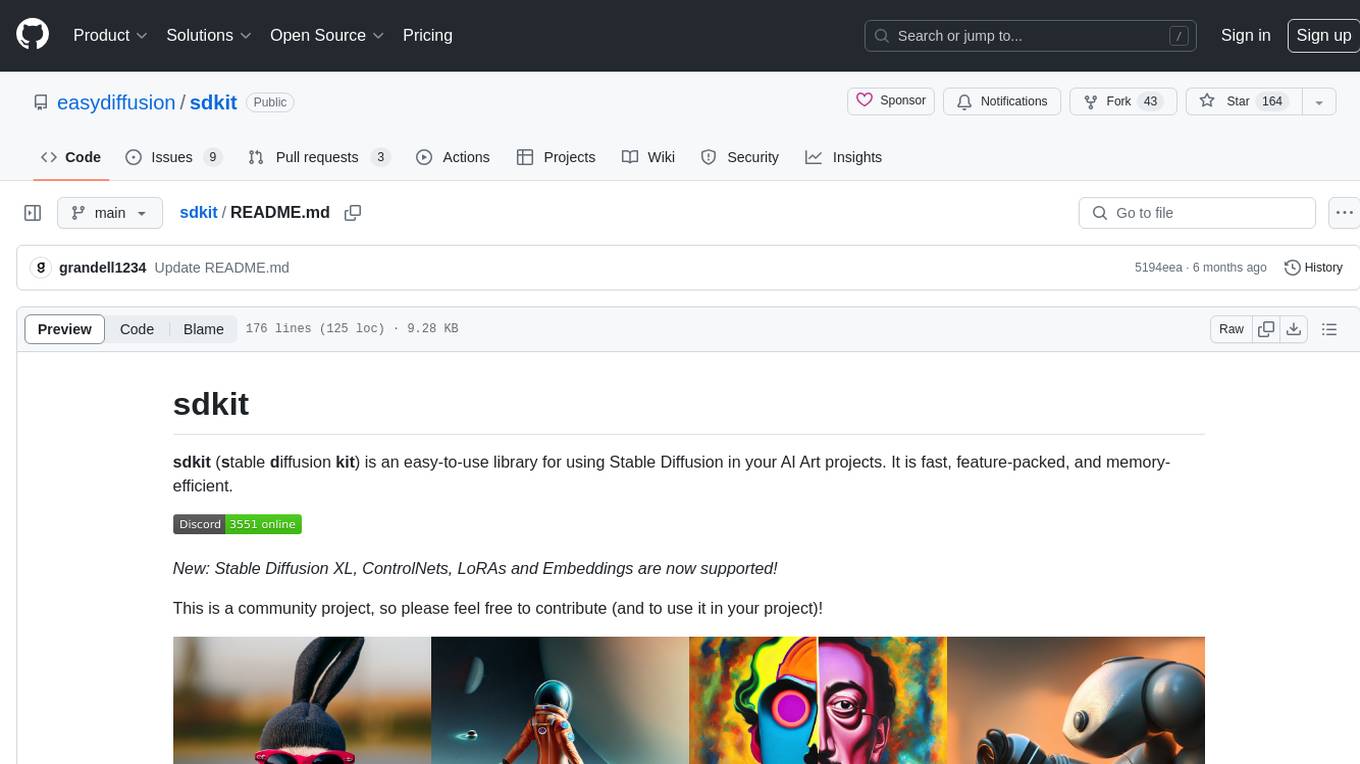
sdkit
sdkit (stable diffusion kit) is an easy-to-use library for utilizing Stable Diffusion in AI Art projects. It includes features like ControlNets, LoRAs, Textual Inversion Embeddings, GFPGAN, CodeFormer for face restoration, RealESRGAN for upscaling, k-samplers, support for custom VAEs, NSFW filter, model-downloader, parallel GPU support, and more. It offers a model database, auto-scanning for malicious models, and various optimizations. The API consists of modules for loading models, generating images, filters, model merging, and utilities, all managed through the sdkit.Context object.

fasttrackml
FastTrackML is an experiment tracking server focused on speed and scalability, fully compatible with MLFlow. It provides a user-friendly interface to track and visualize your machine learning experiments, making it easy to compare different models and identify the best performing ones. FastTrackML is open source and can be easily installed and run with pip or Docker. It is also compatible with the MLFlow Python package, making it easy to integrate with your existing MLFlow workflows.
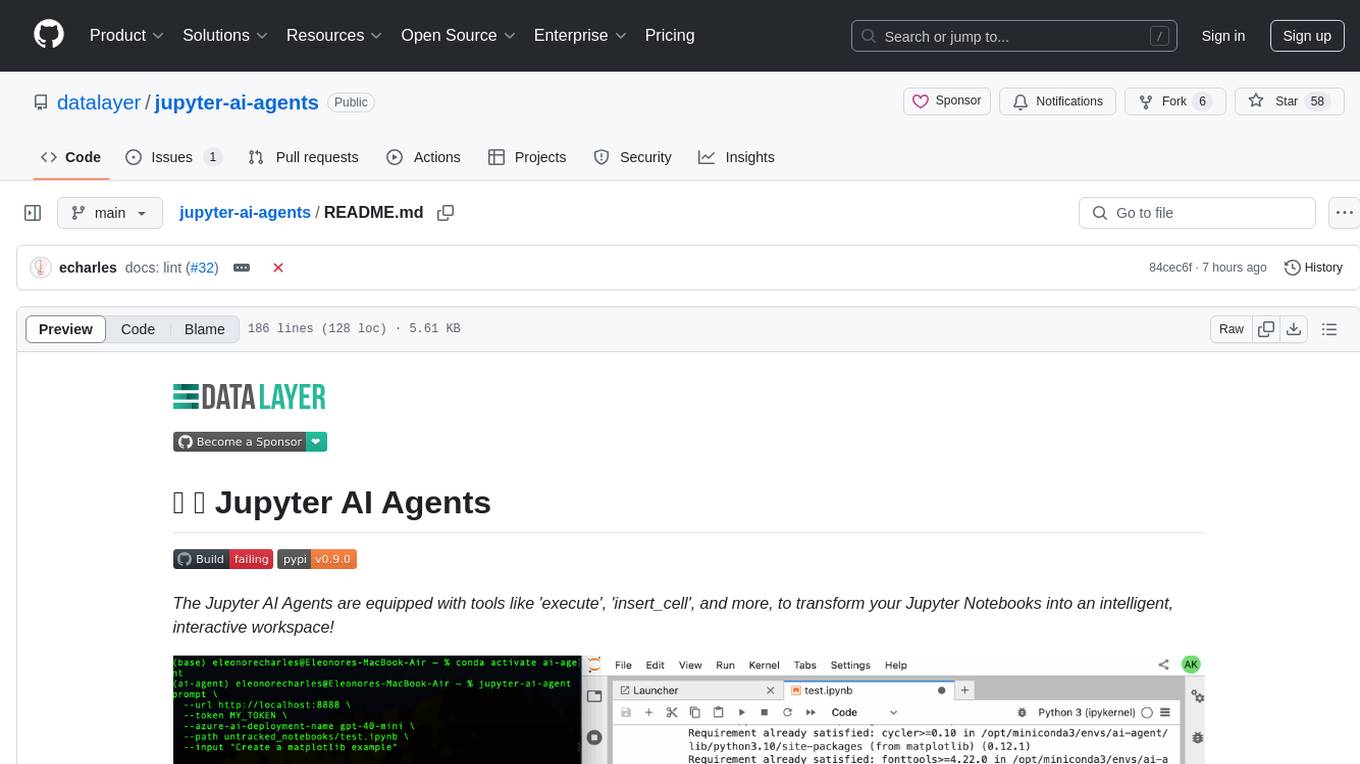
jupyter-ai-agents
The Jupyter AI Agents is a tool equipped with 'execute', 'insert_cell', and more, to transform Jupyter Notebooks into an intelligent, interactive workspace. It empowers AI models to interact with and modify Jupyter Notebooks comprehensively, operating on the entire notebook level. The agent communicates through RTC, enabling seamless modifications based on user instructions or notebook events. It uses the LangChain Agent Framework to manage interactions between AI models and tools, supporting real-time collaboration in JupyterLab. The tool can be installed via pip or from source, and supports multiple AI model providers like Azure OpenAI.
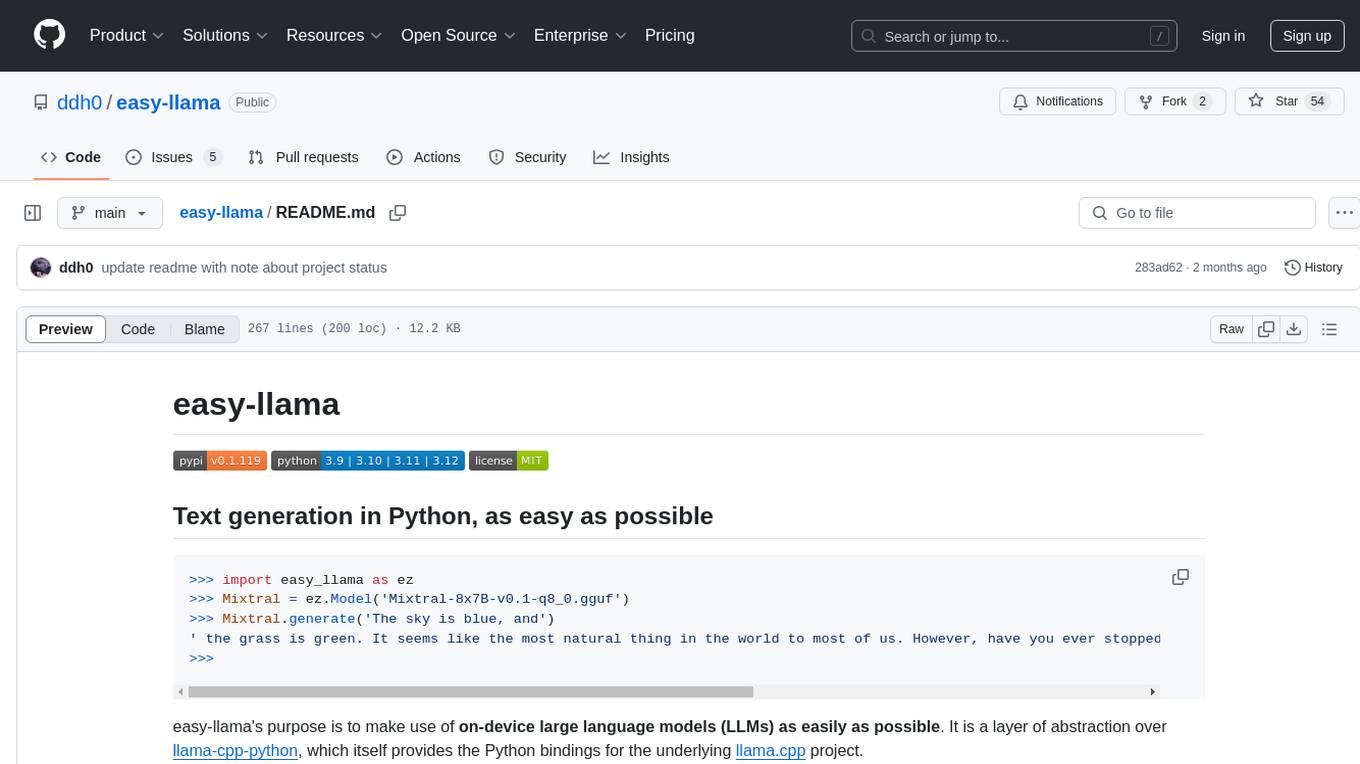
easy-llama
easy-llama is a Python tool designed to make text generation using on-device large language models (LLMs) as easy as possible. It provides an abstraction layer over llama-cpp-python, simplifying the process of utilizing language models. The tool offers features such as automatic context length adjustment, terminal-based interactive chat, programmatic multi-turn interaction, support for various prompt formats, message-based context length handling, retrieval of likely next tokens, and compatibility with multiple models supported by llama-cpp-python. The upcoming version 0.2.0 will remove the llama-cpp-python dependency for improved efficiency and maintainability.
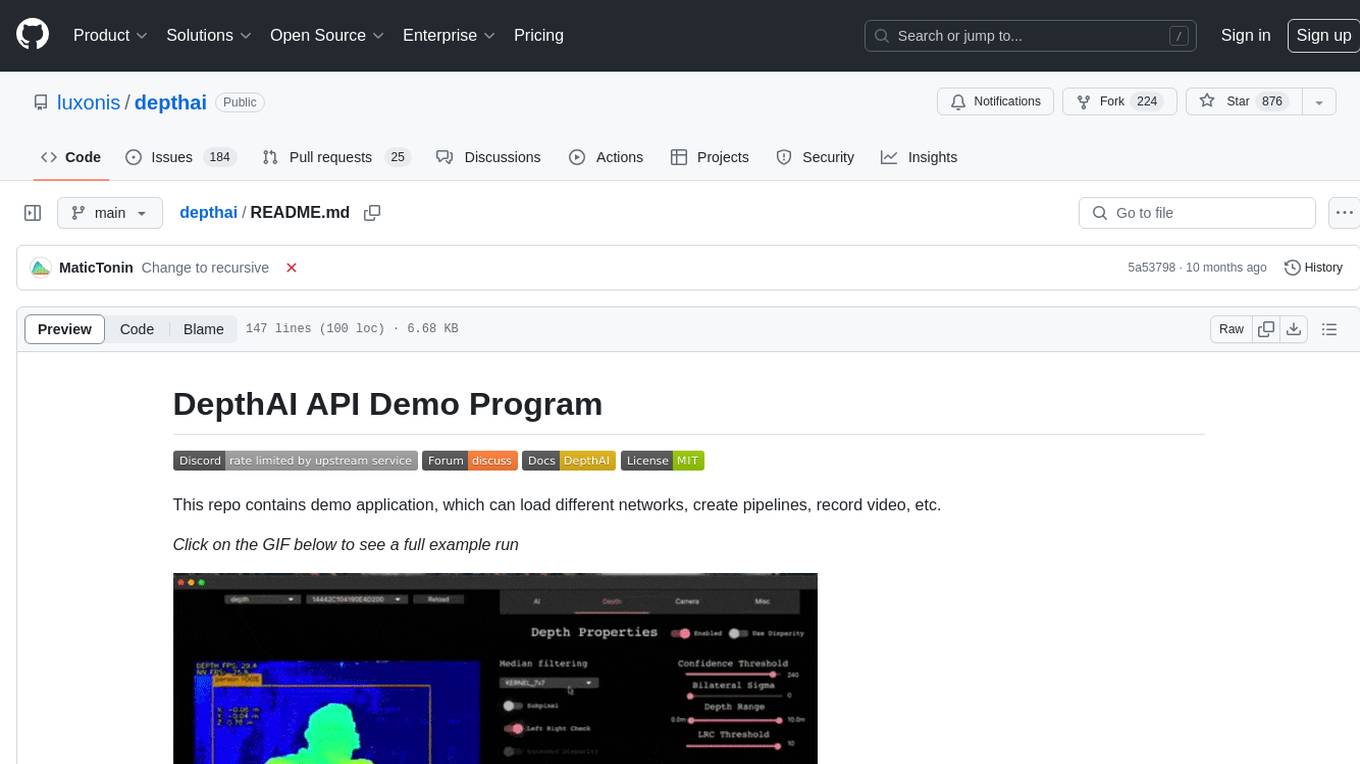
depthai
This repository contains a demo application for DepthAI, a tool that can load different networks, create pipelines, record video, and more. It provides documentation for installation and usage, including running programs through Docker. Users can explore DepthAI features via command line arguments or a clickable QT interface. Supported models include various AI models for tasks like face detection, human pose estimation, and object detection. The tool collects anonymous usage statistics by default, which can be disabled. Users can report issues to the development team for support and troubleshooting.
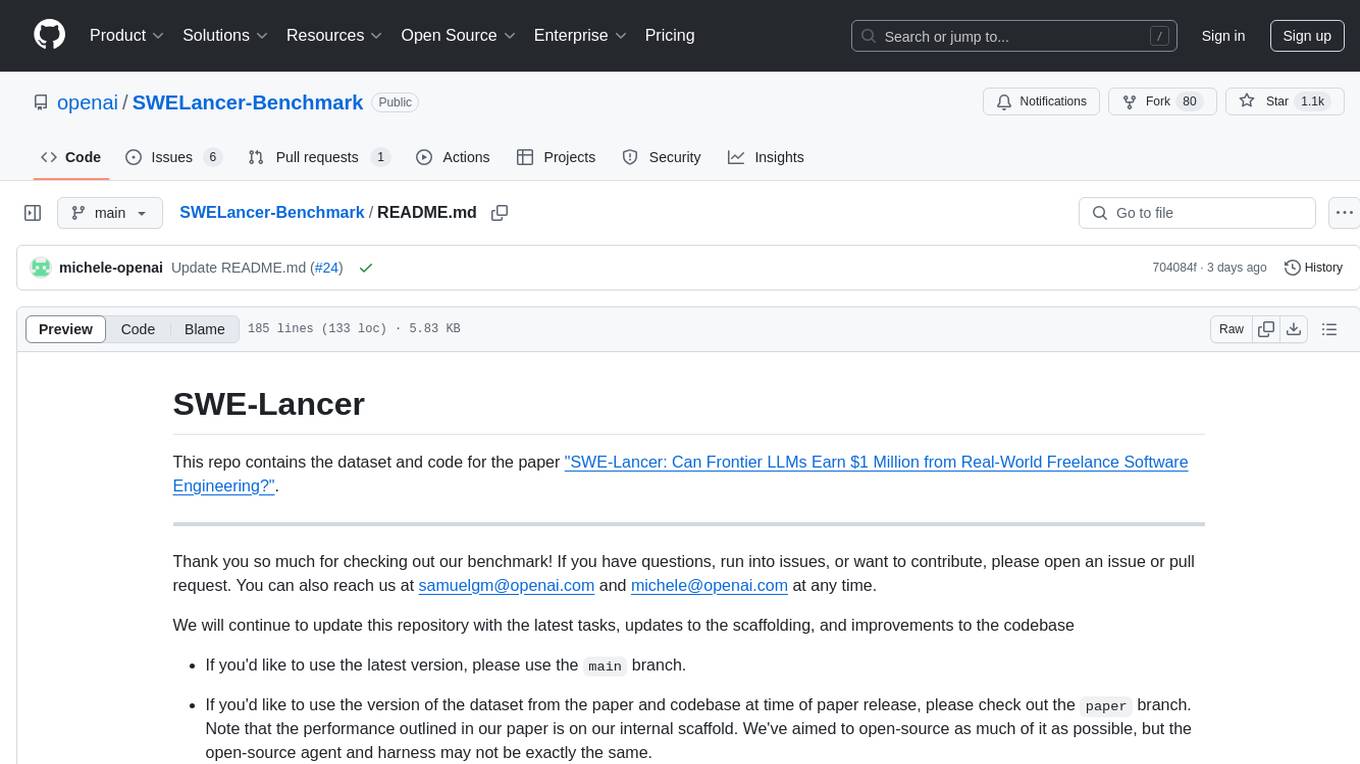
SWELancer-Benchmark
SWE-Lancer is a benchmark repository containing datasets and code for the paper 'SWE-Lancer: Can Frontier LLMs Earn $1 Million from Real-World Freelance Software Engineering?'. It provides instructions for package management, building Docker images, configuring environment variables, and running evaluations. Users can use this tool to assess the performance of language models in real-world freelance software engineering tasks.
For similar tasks
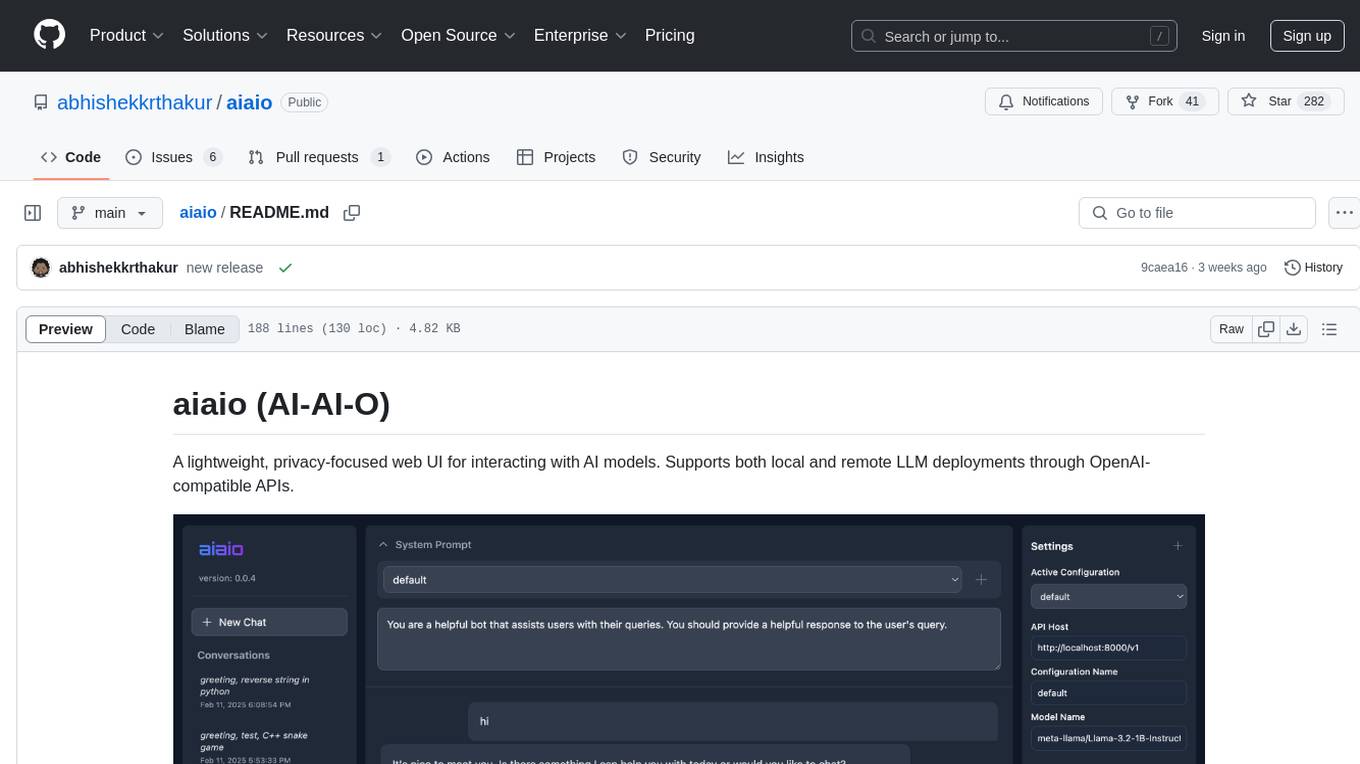
aiaio
aiaio (AI-AI-O) is a lightweight, privacy-focused web UI for interacting with AI models. It supports both local and remote LLM deployments through OpenAI-compatible APIs. The tool provides features such as dark/light mode support, local SQLite database for conversation storage, file upload and processing, configurable model parameters through UI, privacy-focused design, responsive design for mobile/desktop, syntax highlighting for code blocks, real-time conversation updates, automatic conversation summarization, customizable system prompts, WebSocket support for real-time updates, Docker support for deployment, multiple API endpoint support, and multiple system prompt support. Users can configure model parameters and API settings through the UI, handle file uploads, manage conversations, and use keyboard shortcuts for efficient interaction. The tool uses SQLite for storage with tables for conversations, messages, attachments, and settings. Contributions to the project are welcome under the Apache License 2.0.

1backend
1Backend is a flexible and scalable platform designed for running AI models on private servers and handling high-concurrency workloads. It provides a ChatGPT-like interface for users and a network-accessible API for machines, serving as a general-purpose backend framework. The platform offers on-premise ChatGPT alternatives, a microservices-first web framework, out-of-the-box services like file uploads and user management, infrastructure simplification acting as a container orchestrator, reverse proxy, multi-database support with its own ORM, and AI integration with platforms like LlamaCpp and StableDiffusion.
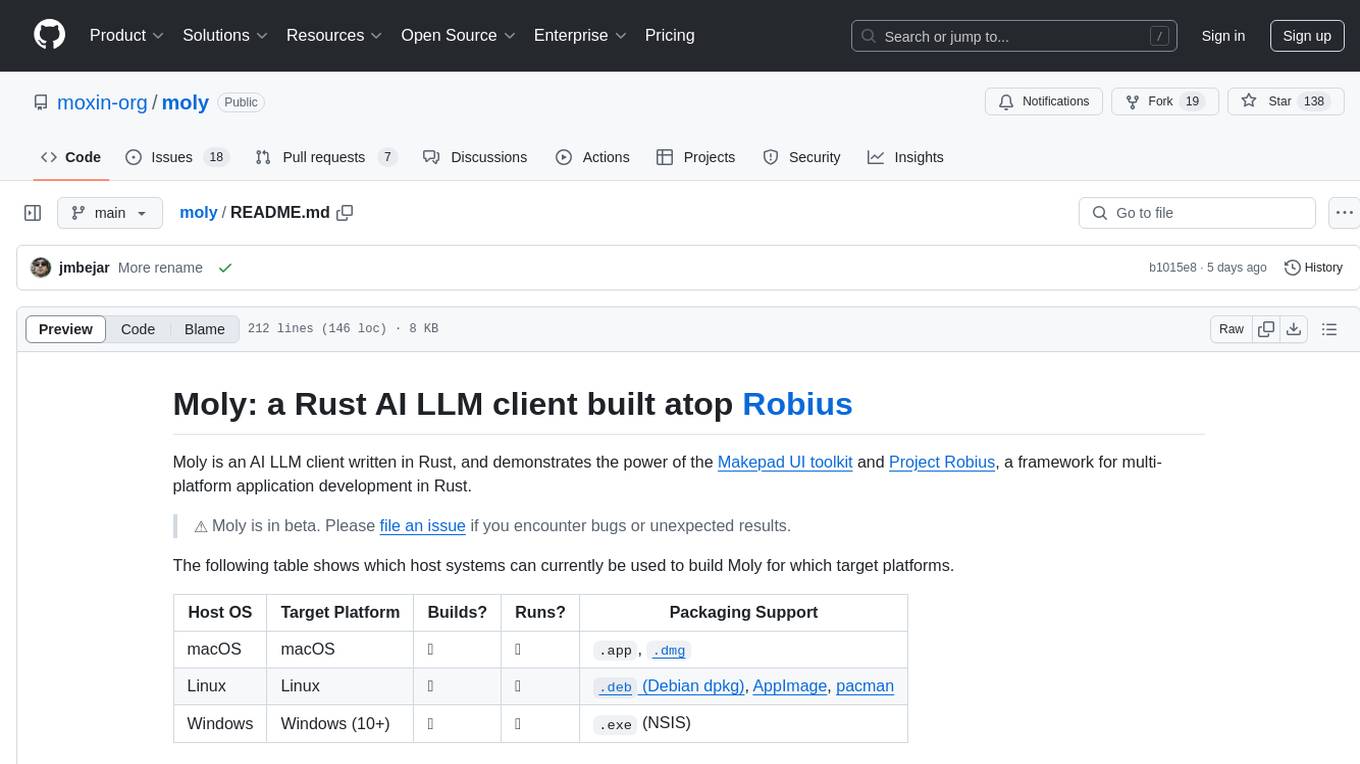
moly
Moly is an AI LLM client written in Rust, showcasing the capabilities of the Makepad UI toolkit and Project Robius, a framework for multi-platform application development in Rust. It is currently in beta, allowing users to build and run Moly on macOS, Linux, and Windows. The tool provides packaging support for different platforms, such as `.app`, `.dmg`, `.deb`, AppImage, pacman, and `.exe` (NSIS). Users can easily set up WasmEdge using `moly-runner` and leverage `cargo` commands to build and run Moly. Additionally, Moly offers pre-built releases for download and supports packaging for distribution on Linux, Windows, and macOS.

openorch
OpenOrch is a daemon that transforms servers into a powerful development environment, running AI models, containers, and microservices. It serves as a blend of Kubernetes and a language-agnostic backend framework for building applications on fixed-resource setups. Users can deploy AI models and build microservices, managing applications while retaining control over infrastructure and data.
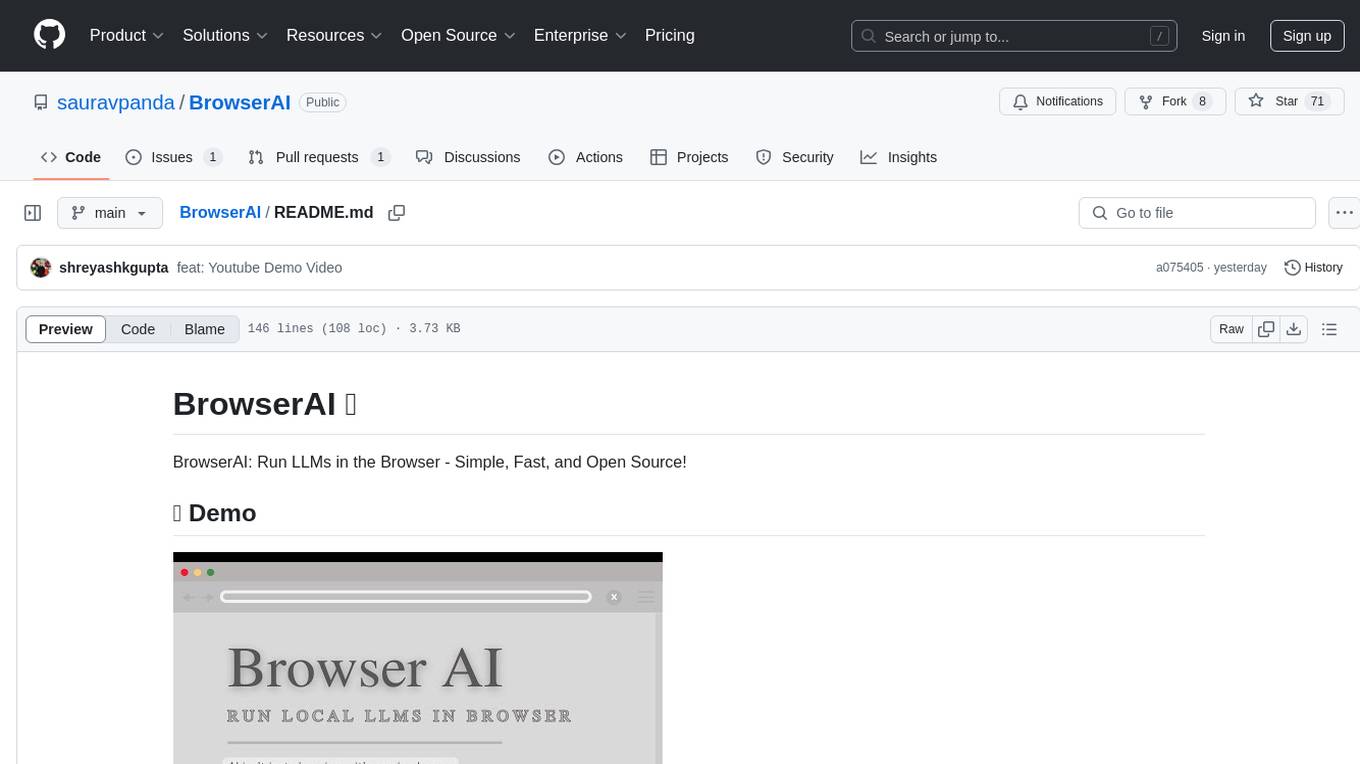
BrowserAI
BrowserAI is a tool that allows users to run large language models (LLMs) directly in the browser, providing a simple, fast, and open-source solution. It prioritizes privacy by processing data locally, is cost-effective with no server costs, works offline after initial download, and offers WebGPU acceleration for high performance. It is developer-friendly with a simple API, supports multiple engines, and comes with pre-configured models for easy use. Ideal for web developers, companies needing privacy-conscious AI solutions, researchers experimenting with browser-based AI, and hobbyists exploring AI without infrastructure overhead.
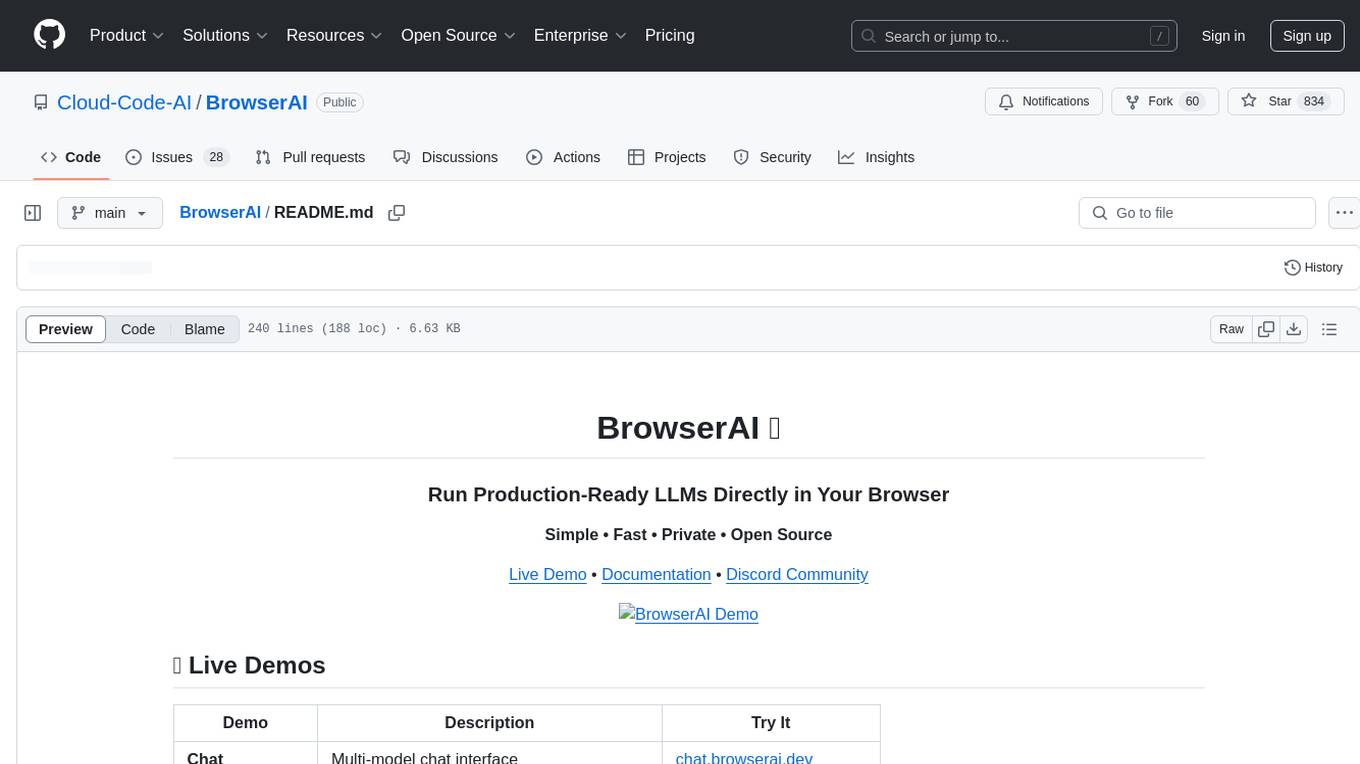
BrowserAI
BrowserAI is a production-ready tool that allows users to run AI models directly in the browser, offering simplicity, speed, privacy, and open-source capabilities. It provides WebGPU acceleration for fast inference, zero server costs, offline capability, and developer-friendly features. Perfect for web developers, companies seeking privacy-conscious AI solutions, researchers experimenting with browser-based AI, and hobbyists exploring AI without infrastructure overhead. The tool supports various AI tasks like text generation, speech recognition, and text-to-speech, with pre-configured popular models ready to use. It offers a simple SDK with multiple engine support and seamless switching between MLC and Transformers engines.
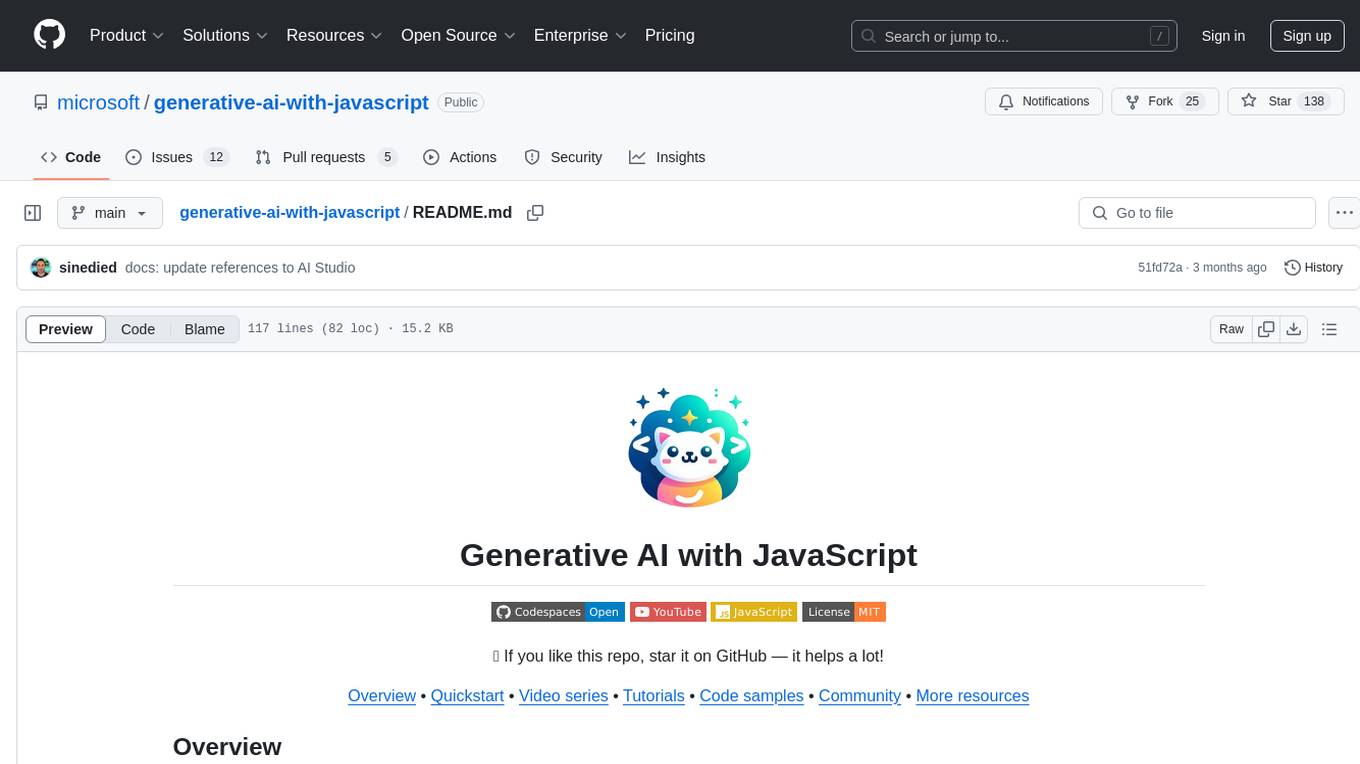
generative-ai-with-javascript
The 'Generative AI with JavaScript' repository is a comprehensive resource hub for JavaScript developers interested in delving into the world of Generative AI. It provides code samples, tutorials, and resources from a video series, offering best practices and tips to enhance AI skills. The repository covers the basics of generative AI, guides on building AI applications using JavaScript, from local development to deployment on Azure, and scaling AI models. It is a living repository with continuous updates, making it a valuable resource for both beginners and experienced developers looking to explore AI with JavaScript.
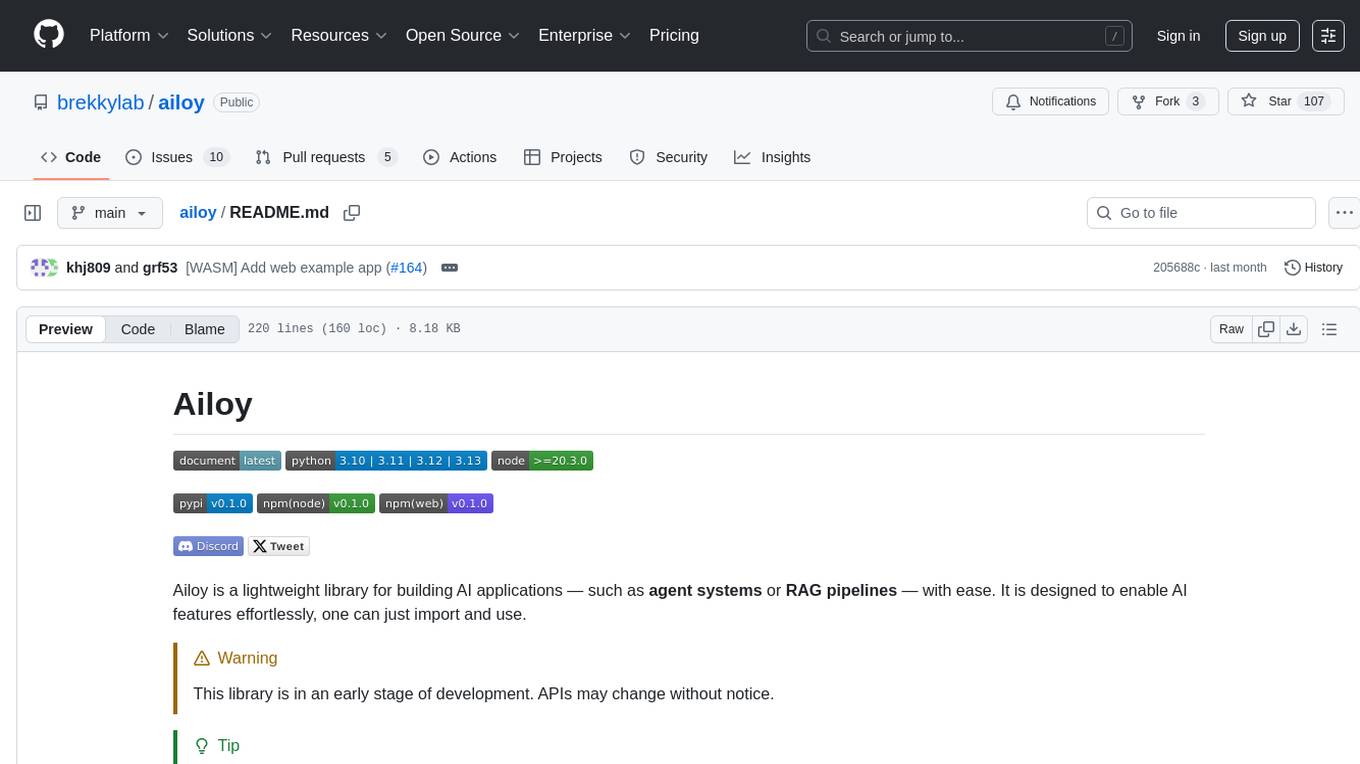
ailoy
Ailoy is a lightweight library for building AI applications such as agent systems or RAG pipelines with ease. It enables AI features effortlessly, supporting AI models locally or via cloud APIs, multi-turn conversation, system message customization, reasoning-based workflows, tool calling capabilities, and built-in vector store support. It also supports running native-equivalent functionality in web browsers using WASM. The library is in early development stages and provides examples in the `examples` directory for inspiration on building applications with Agents.
For similar jobs

promptflow
**Prompt flow** is a suite of development tools designed to streamline the end-to-end development cycle of LLM-based AI applications, from ideation, prototyping, testing, evaluation to production deployment and monitoring. It makes prompt engineering much easier and enables you to build LLM apps with production quality.

deepeval
DeepEval is a simple-to-use, open-source LLM evaluation framework specialized for unit testing LLM outputs. It incorporates various metrics such as G-Eval, hallucination, answer relevancy, RAGAS, etc., and runs locally on your machine for evaluation. It provides a wide range of ready-to-use evaluation metrics, allows for creating custom metrics, integrates with any CI/CD environment, and enables benchmarking LLMs on popular benchmarks. DeepEval is designed for evaluating RAG and fine-tuning applications, helping users optimize hyperparameters, prevent prompt drifting, and transition from OpenAI to hosting their own Llama2 with confidence.

MegaDetector
MegaDetector is an AI model that identifies animals, people, and vehicles in camera trap images (which also makes it useful for eliminating blank images). This model is trained on several million images from a variety of ecosystems. MegaDetector is just one of many tools that aims to make conservation biologists more efficient with AI. If you want to learn about other ways to use AI to accelerate camera trap workflows, check out our of the field, affectionately titled "Everything I know about machine learning and camera traps".

leapfrogai
LeapfrogAI is a self-hosted AI platform designed to be deployed in air-gapped resource-constrained environments. It brings sophisticated AI solutions to these environments by hosting all the necessary components of an AI stack, including vector databases, model backends, API, and UI. LeapfrogAI's API closely matches that of OpenAI, allowing tools built for OpenAI/ChatGPT to function seamlessly with a LeapfrogAI backend. It provides several backends for various use cases, including llama-cpp-python, whisper, text-embeddings, and vllm. LeapfrogAI leverages Chainguard's apko to harden base python images, ensuring the latest supported Python versions are used by the other components of the stack. The LeapfrogAI SDK provides a standard set of protobuffs and python utilities for implementing backends and gRPC. LeapfrogAI offers UI options for common use-cases like chat, summarization, and transcription. It can be deployed and run locally via UDS and Kubernetes, built out using Zarf packages. LeapfrogAI is supported by a community of users and contributors, including Defense Unicorns, Beast Code, Chainguard, Exovera, Hypergiant, Pulze, SOSi, United States Navy, United States Air Force, and United States Space Force.

llava-docker
This Docker image for LLaVA (Large Language and Vision Assistant) provides a convenient way to run LLaVA locally or on RunPod. LLaVA is a powerful AI tool that combines natural language processing and computer vision capabilities. With this Docker image, you can easily access LLaVA's functionalities for various tasks, including image captioning, visual question answering, text summarization, and more. The image comes pre-installed with LLaVA v1.2.0, Torch 2.1.2, xformers 0.0.23.post1, and other necessary dependencies. You can customize the model used by setting the MODEL environment variable. The image also includes a Jupyter Lab environment for interactive development and exploration. Overall, this Docker image offers a comprehensive and user-friendly platform for leveraging LLaVA's capabilities.

carrot
The 'carrot' repository on GitHub provides a list of free and user-friendly ChatGPT mirror sites for easy access. The repository includes sponsored sites offering various GPT models and services. Users can find and share sites, report errors, and access stable and recommended sites for ChatGPT usage. The repository also includes a detailed list of ChatGPT sites, their features, and accessibility options, making it a valuable resource for ChatGPT users seeking free and unlimited GPT services.

TrustLLM
TrustLLM is a comprehensive study of trustworthiness in LLMs, including principles for different dimensions of trustworthiness, established benchmark, evaluation, and analysis of trustworthiness for mainstream LLMs, and discussion of open challenges and future directions. Specifically, we first propose a set of principles for trustworthy LLMs that span eight different dimensions. Based on these principles, we further establish a benchmark across six dimensions including truthfulness, safety, fairness, robustness, privacy, and machine ethics. We then present a study evaluating 16 mainstream LLMs in TrustLLM, consisting of over 30 datasets. The document explains how to use the trustllm python package to help you assess the performance of your LLM in trustworthiness more quickly. For more details about TrustLLM, please refer to project website.

AI-YinMei
AI-YinMei is an AI virtual anchor Vtuber development tool (N card version). It supports fastgpt knowledge base chat dialogue, a complete set of solutions for LLM large language models: [fastgpt] + [one-api] + [Xinference], supports docking bilibili live broadcast barrage reply and entering live broadcast welcome speech, supports Microsoft edge-tts speech synthesis, supports Bert-VITS2 speech synthesis, supports GPT-SoVITS speech synthesis, supports expression control Vtuber Studio, supports painting stable-diffusion-webui output OBS live broadcast room, supports painting picture pornography public-NSFW-y-distinguish, supports search and image search service duckduckgo (requires magic Internet access), supports image search service Baidu image search (no magic Internet access), supports AI reply chat box [html plug-in], supports AI singing Auto-Convert-Music, supports playlist [html plug-in], supports dancing function, supports expression video playback, supports head touching action, supports gift smashing action, supports singing automatic start dancing function, chat and singing automatic cycle swing action, supports multi scene switching, background music switching, day and night automatic switching scene, supports open singing and painting, let AI automatically judge the content.
